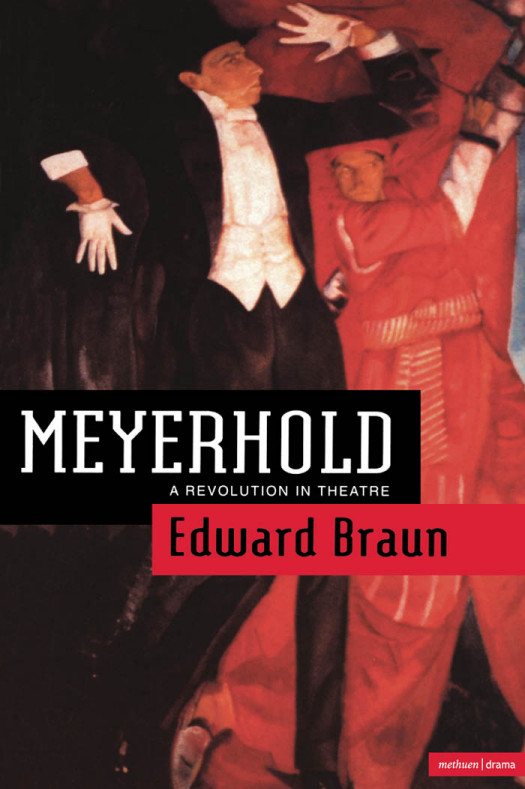Edward Braun: Meyerhold: A Revolution in Theatre (1979/1995)
Filed under book | Tags: · art, biography, biomechanics, constructivism, epic theatre, history of theatre, proletkult, revolution, symbolism, theatre

“Legendary Russian theater director Vsevolod Meyerhold (1874-1940) led the revolt against naturalism and flouted Stalinist socialist realism with his avant-garde productions incorporating mime, constructivist sets, musical scores and formalized scenery. His scenic invention and use of cinematic techniques culminated in his 1926 staging of Gogol’s The Government Inspector as well as reinterpretations of classics such as Pushkin’s Queen of Spades. Braun, a drama professor in England, sees Meyerhold as a supreme director-poet for whom the theater was designed to shatter the audience’s complacency. Decked out with 145 photographs of set reproductions, costumes and posters, Braun’s vibrant study restores Meyerhold’s radical legacy for contemporary theater. This revision of a work first published in 1979 draws on a wealth of newly discovered writings by Meyerhold, as well as KGB files released since 1989 that tell the full story of the director’s arrest, torture and execution after being falsely labeled a foreign agent by Stalin.” (Source)
Originally published in 1979
Second, revised and expanded, edition
Publisher Methuen Drama, 1995
ISBN 0413727300
347 pages
Reviews: Sharon Marie Carnicke (Modern Drama, 1996), Christine Kiebuzinska (Theatre Journal, 1996), Phil Shannon (Green Left Weekly, 1999).
PDF (33 MB)
Comment (0)Richard Barbrook: Class Wargames: Ludic Subversion Against Spectacular Capitalism (2014)
Filed under book | Tags: · activism, avant-garde, capitalism, constructivism, game, military, neoliberalism, new left, participation, politics, psychogeography, situationists, war

“Why should radicals be interested in playing wargames? Surely the Left can have no interest in such militarist fantasies? Yet, Guy Debord – the leader of the Situationist International – placed such importance on his invention of The Game of War that he described it as the most significant of his accomplishments.
Intrigued by this claim, a multinational group of artists, activists and academics formed Class Wargames to investigate the political and strategic lessons that could be learnt from playing his ludic experiment. While the ideas of the Situationists continue to be highly influential in the development of subversive art and politics, relatively little attention has been paid to their strategic orientation. Determined to correct this deficiency, Class Wargames is committed to exploring how Debord used the metaphor of the Napoleonic battlefield to propagate a Situationist analysis of modern culture and politics. Inspired by his example its members have also hacked other military simulations: H.G. Wells’ Little Wars; Chris Peers’ Reds versus Reds and Richard Borg’s Commands & Colors. Playing wargames is not a diversion from politics: it is the training ground of tomorrow’s communist insurgents.
Fusing together historical research on avant-garde artists, political revolutionaries and military theorists with narratives of five years of public performances, Class Wargames provides a strategic and tactical manual for subverting the economic, political and ideological hierarchies of early-21st century neoliberal capitalism. The knowledge required to create a truly human civilisation is there to be discovered on the game board!” (from the back cover)
Publisher Minor Compositions, an imprint of Autonomedia, 2014
Creative Commons BY-NC 3.0 Licence
ISBN 9781570272936
444 pages
via Marcell
PDF (8 MB)
Scribd
See also Guy Debord’s ‘The Game of War’ – The Film (26 min, c2011)
Margaret A. Rose: Marx’s Lost Aesthetic: Karl Marx and the Visual Arts (1984)
Filed under book | Tags: · 1840s, 1860s, 1920s, aesthetics, art, art history, art theory, avant-garde, constructivism, marxism, painting, socialist realism

“This book offers an original and challenging study of Marx’s contact with the visual arts, aesthetic theories, and art policies in nineteenth-century Europe. It differs from previous discussions of Marxist aesthetic theory in looking at Marx’s views from an art-historical rather than from a literary perspective, and in placing those views in the context of the art practices, theories, and policies of Marx’s own time. Dr Rose begins her work by discussing Marx’s planned treatise on Romantic art of 1842 against the background of the philosophical debates, cultural policies, and art practices of the 1840s, and looks in particular at the patronage given to the group of German artists known as the ‘Nazarenes’ in those years, who are discussed in relation to both the English Pre-Raphaelites, popular in the London known to Marx, and to the Russian Social Realists of the 1860s. The author goes on to consider claims of twentieth-century Marxist art theories and practices to have represented Marx’s own views on art. The book the conflicting claims made on Marx’s views by the Soviet avant-garde Constructivists of the 1920s and of the Socialist Realists who followed them are considered, and are related back to the aesthetic theories and practices discussed in the earlier chapters.”
Publisher Cambridge University Press, 1984
ISBN 0521369797, 9780521369794
216 pages
via Charles, in the Unlimited Edition
Reviews and commentaries: Genet-Delacroix Marie-Claude (Annales. Économies, Sociétés, Civilisations, 1986, FR), Harold E. Maha (History of European Ideas, 1987), Eugene Hirschfeld (2010).
PDF (25 MB, no OCR)
See also the entry on Marxist aesthetics on Monoskop wiki.

